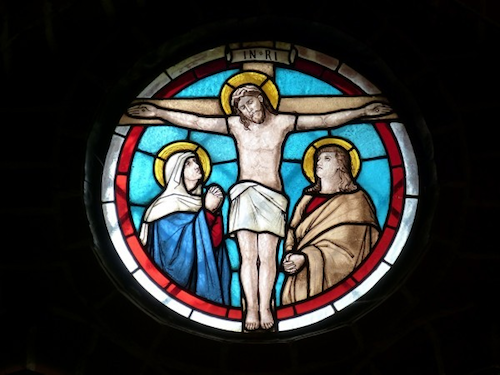We run our website the way we wished the whole internet worked: we provide high quality original content with no ads. We are funded solely by your direct support. Please consider supporting this project.

God’s Love is Cruciform
Paul instructs us in what it means to follow Jesus, when he stated, “Follow God’s example, therefore, as dearly loved children and walk in the way of love, just as Christ loved us and gave himself up for us as a fragrant offering and sacrifice to God (Eph 5:1-2). Here Paul defines what it means to imitate God and to “live a life of love” not merely by pointing us to Jesus but by specifying that we are to follow the example of Christ who “loved us and gave himself up for us…” (Eph. 5:1-2, NIV, emphasis added). Paul virtually equates “following (mimētēs) God” (which could be translated as “imitating God”) with living “a life of love, just as Christ loved us and gave himself up for us.”
Several verses later Paul applies this cruciform understanding of love to husbands when he tells them to “love your wives, just as Christ loved the church and gave himself up for her” (Eph. 5:25). While everything Jesus did reflected God’s love, it’s clear that Paul regarded the cross to be the ultimate expression of this love.
Reflecting this same perspective, Paul elsewhere declares that God’s love for us is demonstrated not merely in the fact that Christ became a human and lived a life of self-sacrificial service to others, as remarkable as these things are. It is rather most powerfully demonstrated in the fact that “[w]hile we were yet sinners, Christ died for us” (Rom. 5:8). So too, Paul fleshes out what it looks like for the Philippians to love one another by instructing them to have “the same attitude of mind Christ Jesus had” (Phil. 2:5). This attitude was displayed when Jesus set aside his divine prerogatives, “made himself nothing,” and “humbled himself by becoming obedient to death – even death on a cross” (Phil. 2:6-9).
So too, when Paul explains why he and his colleagues appear to some to be “out of [their] mind” (2 Cor. 5:13) because of the sacrifices they make as “ambassadors of Christ” (2 Cor. 5:20), he declares, “Christ’s love compels us” (2 Cor. 5:14). He then elaborates on this love by appealing to the cross, explaining that Christ “died for all” so that “those who live should no longer live for themselves but for him who died for them and was raised again” (2 Cor. 5:15).
The cross is clearly the definitive expression of Christ’s love and thus the criteria by which his followers must measure their love. It’s no surprise, therefore, when Paul later challenges the Corinthians to prove their love by sacrificially giving to brothers and sisters in need (2 Cor. 8: 7-8, 24). “Cruciformity” lies at the heart of Paul’s understanding of God, salvation and the kingdom life. More could be said (as I have two chapters on this in Crucifixion of the Warrior God), but I believe this suffices to demonstrate that the love that God eternally is, as revealed in Jesus Christ, and the love that is to characterize all who are “children of the most High,” is cruciform in nature.
Photo via VisualHunt.com
Category: General
Tags: Crucifixion of the Warrior God, Cruciform Theology, God is Love, God's Love
Topics: Attributes and Character
Related Reading

The Greatest Mystery of the Christian Faith
God has always been willing to stoop to accommodate the fallen state of his covenant people in order to remain in a transforming relationship with them and in order to continue to further his sovereign purposes through them. Out of love for humankind, Scripture tells us, Jesus emptied himself of his divine prerogatives, set aside…

The ReKnew Cross Vision Conference is Coming!
Since its release in mid-April, Crucifixion of the Warrior God has helped a multitude of people fully embrace for the first time the beautiful God revealed in Jesus’ cross-centered life and ministry. It has helped many others regain their confidence in the Bible as “God’s inspired word,” despite its many ugly, violent depictions of God.…

The Violent “Church Triumphant”
In light of how central enemy-loving non-violence is to Jesus’ teaching and to his cross-centered revelation of God, we have to wonder why the church has refused to listen to its head and instead condoned violence, as pointed out in the previous post? Christian theologians have used OT’s violent portraits of God, at least since…

The Centrality of Christ in Hebrews, Part 1
The intense Christocentricity that the New Testament writers embrace is nowhere more clearly and consistently illustrated than in the book of Hebrews. Throughout this work we find a repeated emphasis on the many ways the revelation given to us in Christ surpasses that of the Old Testament. The author begins by stressing how the revelation…

Eye for Eye: That Time Jesus Refuted An Old Testament Teaching
One of the most surprising aspects of Jesus’ teaching is that, while he clearly shared his contemporaries’ view of the Old Testament as inspired by God, he was nevertheless not afraid of repudiating it when he felt led by his Father to do so (Jn. 8:28; 12:49-50; 14:31). For example, while the OT commands people…

Podcast: Is the Cruciform Hermeneutic a Little Too New?
Greg looks at the history of the Cruciform Hermeneutic. http://traffic.libsyn.com/askgregboyd/Episode_0446.mp3
